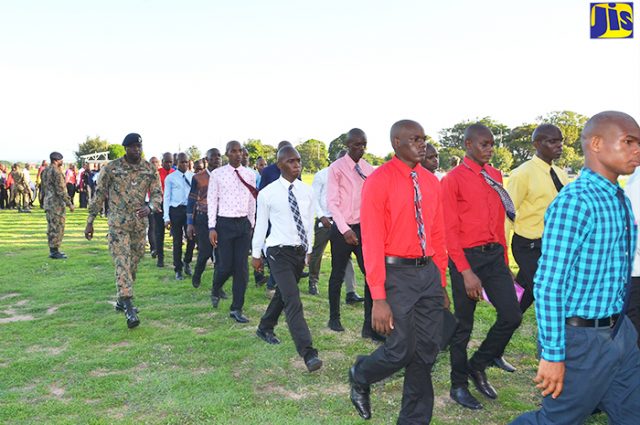JIS: For as long as he can remember, Yohan Smith has wanted to join the Jamaica Defence Force (JDF) and become a “good soldier” like his father.
“I see my father as a successful member of the JDF and I would love to follow in his footsteps and have a successful career myself,” he tells JIS News.
The young man from Linstead, St. Catherine, is taking the first step in fulfilling his lifelong dream. He was among the first batch of 250 recruits for the National Service Corps (NSC) programme.
The brainchild of Prime Minister the Most Hon. Andrew Holness, the NSC aims to create an avenue for young people, ages 18 to 23, to be fully empowered through national service.
Over a one-year period, the youngsters will undergo a modified version of the JDF’s traditional basic military training and receive on-the-job instruction in various aspects of the JDF’s operations such as the Coast Guard, Air Wing and engineering.
They will also benefit from vocational and life skills training.
Upon completion, the participants will be given the opportunity to continue on as soldiers in the JDF or join the Jamaica Constabulary Force (JCF), Department of Correctional Services or become security guards.
The NSC recruits will be remunerated accordingly, be separate in identity and fully provided for in law.
Yohan tells JIS News that he heard about the programme through friends and after further research on the Internet he decided to sign up.
He says he is pleased with the opportunity provided for skills training. “I am glad to be a part of it. It’s a wonderful initiative and I want to be a part of the change that everybody talks about,” he adds.
Another participant, Christopher Golding from Bog Walk, says he heard about the programme while applying for the regular JDF corps.
“There’s a lot of opportunity there. You get to learn a lot of skills and gain knowledge. This is a good step for me,” he notes.
Jaydon Coombs of Hope Bay, Portland, says at the end of the training he hopes to be selected for the JDF.
“I have loved the army since I was a little boy. I decided to apply for this programme because of the skills it offers that will help me in the future. It will help me if I leave the army, I have the skills to pursue another career,” he points out.
Speaking in an interview with JIS News, Media Affairs Officer at the JDF, Lieutenant Aaron Gabriel, explains that interested persons will have to fulfil the requisite medical requirements and pass an entrance test to participate in the programme.
“We require that the (persons) be free from any disability. They must have perfect vision, not colour blind, they don’t have any asthma or any other ailments that may prevent them from being able to go through the rigours of training,” he informs.
Lt. Gabriel notes that the aim is to train 1,000 persons per year, with 250 persons per cohort.
“While the first cohort is in training, recruitment is going on for the second cohort. So at any point in time, we would have at least two cohorts in training. The JDF is always recruiting. If someone wants to apply, they can go to our website which is www.jdfweb.com and just click on the link that says join the JDF,” Lt. Gabriel points out.
He informs that the training provided under the NSC programme is broken down into three phases.
During phase one, participants will undergo basic military training such as first aid, foot drill, military tactics and land navigation. Recruits will also be exposed to stress management, harassment training, conflict resolution and financial management.
“During the second phase of the training, they will be introduced to different employment opportunities within the JDF such as engineering, working at the Air Wing, working at the JDF Coast Guard. While they are doing this on-the-job training, they would be brought up to speed with technical skills required to operate within the areas,” Lt. Gabriel says.
“(For) the third phase, they would really be putting everything that they would have learned over the prior two phases into action and having a more hands-on experience within the force,” he explains.
Lt. Gabriel says the NSC can be seen as an avenue through which persons can provide direction in their life or serve their country.
“So, it is to take those persons who want some direction, give them some skills, give them something that when they have finished the training, they are able to make a meaningful contribution, maybe in some other public sector entity or possibly in the civilian world,” he notes.
“Ultimately, we want to take youngsters, give them some practical training and some work experience and then send those people back out into the world so they can have a better impact,” he adds.
The Prime Minister Holness, who spoke to the youngsters at Up Park Camp recently, said the success of the programme will depend on the participants.
“How you take on to training, how you take on to national service, how you maintain the discipline and high standards of the army, how you maintain the spirit of the army and how you give back to the society. This will determine whether or not the programme is a success,” he points out.
The NSC is part of the Learn, Earn, Give back and Save (LEGS) Programme, which aims to assist young people who, by virtue of their circumstances, have become unattached.
The programme falls under the Government’s Housing, Opportunity, Production and Employment (HOPE) initiative, targeting job and training opportunities for unattached young people.
CAPTION: The first group of 250 recruits, who will benefit from military, vocational and life skills training over a one-year period under the National Service Corps (NSC) Programme.



